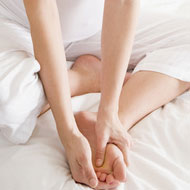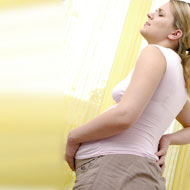- General Articles
- General Pregnancy Questions
- Baby Growth
- Pregnancy Diet
- Miscarriage
- During Pregnancy
- Twin Pregnancy
- Toddler Meals
- Home Remedies During Pregnancy
- Breastfeeding
- Pregnancy Week By Week
- Pregnancy Tests
- Ectopic Pregnancy
- Pregnancy Signs and Symptoms
- Pregnancy Stages
- Potty Training
- Fetal Development
- Preschooler
- Postpartum Depression
- Toddler Illness
- Baby Care
- After Pregnancy
- Molar Pregnancy
- During Delivery
- Beauty and Style
- Pregnancy Clothing
- Preconception
- Fertility
Spider Veins During Pregnancy
Spider veins can be described as a condition that is characterized by a cluster of veins seen on the leg area. These veins are usually bluish-reddish in color and are visible on the calves, ankles, thighs and shins. Sometimes, these veins may also be visible on the face. Spider veins appear in the form of a spider web or sunburst pattern. Many people believe that this condition is the same as varicose veins, as their symptoms are quite similar.
However, spider veins can occur alone or along with another form of varicose veins.
Though anyone can get affected by this problem, women are more likely to develop spider veins than men. The risks of developing this condition increase during pregnancy or when you are going through menopause.
There are many women who only suffer from spider veins during pregnancy.
What are the Causes of Spider Veins During Pregnancy?
You are probably aware that during pregnancy, many of the changes that take place within your body are because of hormones. However, there are several other factors due to which you could develop spider veins during pregnancy.Some of the common causes of spider veins when pregnant, include:
- Heredity: Many moms-to be develop spider veins on the legs or face only because the condition runs in the family.
- Blood circulation and volume: Poor circulation of blood happens to be one of the general causes of spider veins in people. However, when you get pregnant, there is bound to be a surge of blood circulation and volume within your body. This increases pressure on the capillaries below the skin, causing the veins to swell and become enlarged.
- Leg position: You may notice the appearance of spider veins, if you keep your legs crossed for an extended period of time. Sometimes, you may also have this problem because of sitting or standing in the same position a long time.
- Deficiency of Vitamin C: It is believed that the lack of adequate vitamin C may lead to spider veins though there is no scientific evidence to support the claim.
- Constipation: Most pregnant women suffer from constipation during pregnancy, because of taking iron supplement. Excessive straining during a bowel movement constricts the deep veins in your legs, because of which the blood starts circulating through the superficial veins.
What are the Signs of Spider veins?
The symptoms of spider veins are visible, in the form of blue, red or purple veins that appear in a spider-web pattern. You may also experience some amount of pain, heaviness or cramping in the legs. Some of the other symptoms of spider veins during pregnancy include:
- Burning, throbbing or tingling sensation
- Darkening of the skin
- Increased pain after sitting or standing for a long while
- Itchiness around the veins
- Restlessness and tiredness
- Swelling
Most of these signs are temporary and will disappear within 3 months after childbirth. However, you need to consult your doctor as soon as you notice any of these symptoms.
How it Affects the Baby During Pregnancy?
It may be relief to know that spider veins should not harm the baby in any way, during pregnancy. Unfortunately, you may not be so lucky, as the condition may be painful and highly uncomfortable for you.
How to Treat?
Many people don’t undergo treatment for spider veins, especially if there is no pain or discomfort. Under normal circumstances, this affliction can be treated through procedures like:
- Laser surgery
- Sclerotherapy
- Ambulatory phlebectomy
- Vein stripping
- Endoscopic vein surgery
However, these options are strictly off-limit to those treating spider veins during pregnancy as the procedures and medication could have an adverse effect on the baby. Fortunately, there are certain steps you could take to prevent spider veins and alleviate some of its painful symptoms:
- Exercise on a regular basis, to improve the circulation of blood in your legs. Walking and swimming are generally considered safe for pregnant women. Before trying any other form of exercise, do check with your doctor.
- Maintain a healthy body weight even during pregnancy, to reduce the pressure on your circulation system and legs.
- Avoid crossing your legs when you are sitting or lying down. Crossed legs slow down the upward flow of blood, from your legs to your heart. In fact, while resting, keep your legs elevated as much as possible.
- Do not stand for long stretches of time. If you have no other option, keep shifting your body weight from one leg to the other, at regular intervals. Also make it a point to take a short 2-minute walk every half an hour or so.
- Wear support stockings or compression hose that improve the blood circulation. However stay away from any other forms of tight clothing.
While these recommendations are fairly safe if carried out correctly, it is best to consult a doctor before trying out any of them.
Read more articles from the During Pregnancy Category.



 7 Must-Haves Before Your Baby Arrives
7 Must-Haves Before Your Baby Arrives Bonding Games for Babies
Bonding Games for Babies DIY Baby Bath Towel Apron
DIY Baby Bath Towel Apron Common Late Pregnancy Fears
Common Late Pregnancy Fears